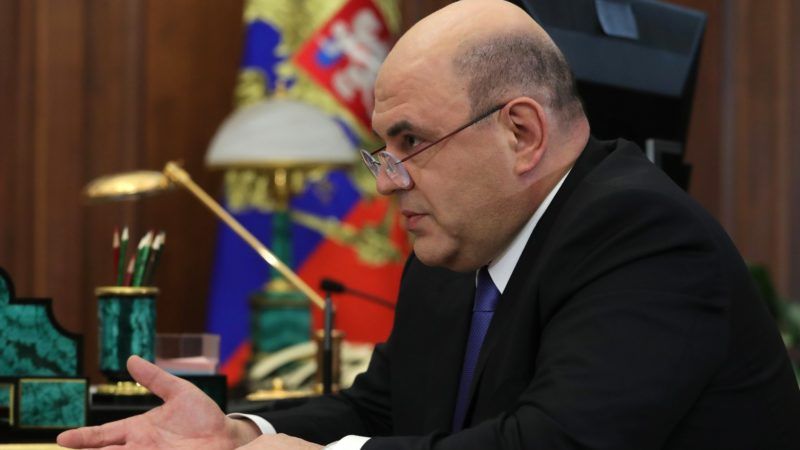Mikhail Mishustin Is an Unexpected Putin Pick for Prime Minister
An obscure former finance minister known for anti-corruption efforts, Mishustin is unlikely to threaten Putin's autocracy.

Vladimir Putin shocked the West when he dismissed longtime prime minister Dmitri Medvedev after announcing plans in January to completely overhaul the Russian constitution.
Yet his pick for the new PM, former tax minister Mikhail Mishustin, shows Putin is aiming for more than his usual placeholder. His technological experience provides Putin with a vehicle to strengthen authoritarianism while giving people the impression that he wants to improve the dwindling economy.
"Mishustin was a suitable choice for Putin, because his obscurity makes it unlikely for people to see him as an official successor," Alexander Morozov, an expert at the Boris Nemtsov Academic Center for the Study of Russia, told Reason.
Mishustin will also be adept at appropriating funds for the government's infrastructure projects, Morozov added, as inadequate government spending is a pressing issue for the Kremlin.
He also has a reputation in the Russian business community of getting things done, economist Sergei Guriev said in an interview with Echo of Moscow Radio. Putin might use him to show Russian citizens that the country's public development projects are continuing, giving them the impression that Putin is concerned for their welfare.
Prior to entering the public sector in 1998, Mishustin worked in information technology. In 1992, after graduating with a systems engineering degree, Mishustin worked at the International Computer Club, a nonprofit organization that collaborated with Western tech firms to help modernize the Russian system. With the help of Boris Fyodorov, Russia's first finance minister, Mishustin gained substantial exposure to finance and government affairs before being named tax chief of Russia in 2010.
Using Mishustin's technological prowess, former White House economist Joseph Sullivan points out in Foreign Policy, Putin likely intends to bolster a form of "techno-authoritarianism" similar to that of China:
As taxman, Mishustin developed a set of futuristic technologies that allowed Russia's government to raise revenues. But these technologies also enhanced surveillance capabilities of Putin's authoritarian state. For it's not as if Russia's tax authorities simply set an algorithm on heaps of data to do the impersonal bidding of state administration. Putin's political appointees, like Mishustin, also maintain the ability to identify subjects and dredge up transaction-level data at their own discretion.
During his tenure as a government official, Mishustin revamped the tax collection system through rapid modernization and eased regulatory burdens on international traders.
In a 2010 interview with Russian newspaper Vedomosti, Mishustin touted electronic services as invaluable for catching "corrupt officials." Later, in 2018, he claimed that Russia's tax revenue had increased by almost 70 percent in the past five years.
Despite the emphasis Putin and Mishustin place on fixing government spending, they have also made plans to expand the country's social welfare program. Shortly after Mishustin was appointed as PM, Putin's new executive cabinet introduced a bill in the Duma, the parliament's lower chamber, that would allocate approximately $31.2 billion in federal funds for services such as free school lunches, financial aid for low-income individuals, and healthcare system improvements.
At the very least, Mishustin has a better reputation than Medvedev, whom the public has regarded as increasingly corrupt as the years progressed. Putin's selection also provides more clarity about his plans after the 2024 presidential election: Even if he leaves office, Putin's recent changes to the Russian constitution will ensure that he maintains a substantial influence over the state.
Show Comments (10)